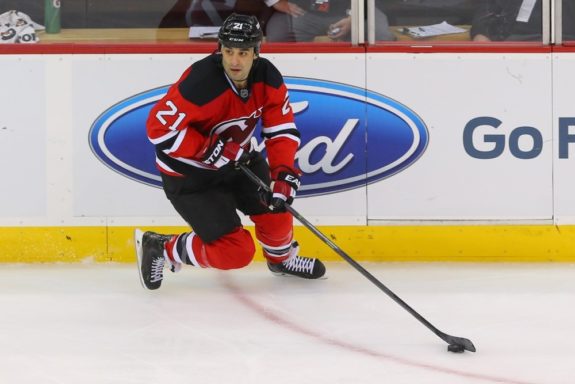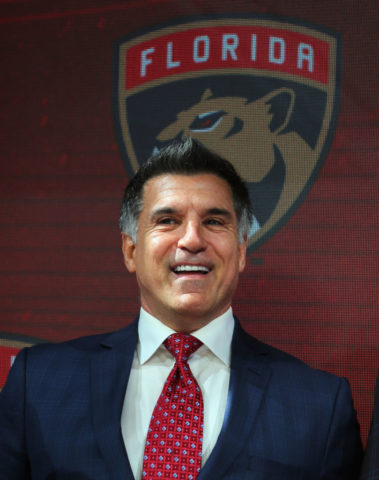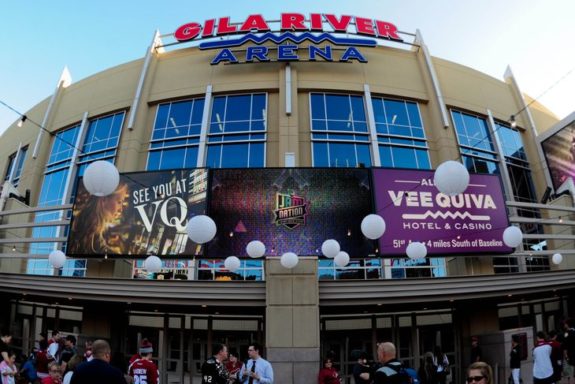Back in the 1980s it seemed like hockey was a sport only played in Canada and a few scattered enclaves across the northeastern United States. Sure, those Soviets an ocean away were getting pretty good at the game, but the heart and sole of hockey was in the snow covered locales of North America. No matter how much of a Red Scare the Soviets put up, it was still Canada’s game.
Fast forward to the present day and hockey’s global presence has increased tenfold. It’s been a major initiative of the Gary Bettman era that the NHL expand its borders. While lineup cards used to find players from Toronto, Montreal, Winnipeg and Massachusetts, the NHL now welcomes players from Russia and across Europe. In reality, the NHL will accept players from anywhere and everywhere, but the sport’s biggest importation of stars comes from Russia and the former Soviet Bloc.
Once in a while, a few NHL players will come from unexpected places that aren’t exactly known as hockey hotbeds. Nathan Walker of the Washington Capitals is a native of Australia, where one’s more likely to grow up playing rugby and cricket instead of lacing up skates. In addition, Andong “Misha” Song was the first native-born Chinese player drafted in the NHL.
Song’s arrival brings huge promise, as the NHL is trying to increase its foothold in not only China, but the entire Asian market. A new-found embracing of winter sports, coupled with the arrival of the Winter Olympics, in the region leads to things looking good for the NHL. There is still one area of the world that the NHL has only made a few attempts to draw interest in, but it might be one of their best options. Is Latin America the NHL’s final frontier?
Why in Latin America
For the sake of argument, I’ll include Mexico in the description of “Latin America”. Russia and Europe aside, North America remains the largest market for the sport of hockey, yet the Latin American neighbors to the South are largely ignored. With a hot climate that isn’t exactly prime hockey weather, it’s not surprising that the NHL hasn’t become must-watch entertainment south of the border.

Soccer is still by an enormous margin Latin America’s favorite pastime. Still, some believe the similarities between hockey and soccer (at the end of the day, you’re just trying to put something in a net) can foster interest between them. How similar are the two? Listen to the Spanish Language broadcaster for the Florida Panthers call a goal. Anyone who has ever watched a soccer game in their life finds that excitement familiar.
Latino Hockey Players
When I took a look at how the NHL can expand into the Chinese market, one of the factors working at their disadvantage was the lack of a recognizable superstar. For example, the popularity of basketball exploded in China after the Houston Rockets drafted Yao Ming. The NHL might have Song waiting in the wings to be their Chinese superstar, but the NHL has had their fair share of recognizable superstars of Latino descent.
First and foremost, Scott Gomez comes to mind. Granted, he may have come from the snow-filled landscape of Alaska, but he shares a common heritage with the Latin people. The impact of Gomez can be best exemplified with Daniel Perez, an ECHL forward who was the subject of a recent NHL.com article.

Perez talked about how much it meant watching a Latino hockey player like Gomez play for his hometown New Jersey Devils and helping him feel like a player that he could connect with paved the way. Perez is paving his own path for others to follow, volunteering with the Devils’ community outreach program and interacting with Hispanic and Latino fans during his college playing days.
On an International Stage
It’s going to be a long time before the Winter Olympics includes matchups with teams such as Mexico, Colombia and Brazil, but that doesn’t mean the groundwork hasn’t already been laid. The past two years, the Florida Panthers have hosted the Amerigol Cup at their practice facility. Teams from Latin America play abbreviated games in what is essentially a mini Olympics or World Juniors. While the sport is still growing in these countries, making it hard for them to compete against the nations that usually win metals at such tournaments, the Amerigol Cup gives them a chance to perform on an international stage. Winner of this past year’s Amerigol Cup, Jamaica, has already put together a long shot Olympic hockey bid.

The Amerigol Cup carries on the tradition of the Pan American Ice Hockey Tournament. From 2014-2017, the tournament allowed an international competition for not only North American teams, but South American teams as well. The tournament played the entirety of its existence in Mexico in Mexico City. While the tournament no longer exists, teams that won metals in competition, such as the Brazilian National Team, have since continued growth in their ice hockey programs.
The importance of international competition also translates to the importance of visible superstars. Back to William Dogulas’s NHL article on Perez and Gomez. Douglas brings up a story about the impact of Gomez with a current coach of the Mexican National Team:
“We had a chance to meet him when I was playing goal for a pee wee team from Mexico; we were playing a tournament in Anaheim and the Devils were playing the Ducks,” said Andres de la Garma, now a coach in Mexico’s national hockey program. “Everybody knew who Scott Gomez was in the Mexican hockey environment, and everybody knew he had Mexican roots. He’s like an inspiration in all Mexican hockey, for sure.”
What Has the NHL Done?
October is Hispanic Heritage Month, and the NHL has been promoting the event and how it pertains to hockey. Talking about the Hispanic population stateside, if they happen to lack interest in the sport, it’s not from lack of exposure. Out of the 10 American states that have a Hispanic population of over one million people, eight have at least one NHL team. The two that don’t are New Mexico and Georgia. Georgia used to have the Atlanta Thrashers, but they’re now in Winnipeg.

One of the eight states on the list is Arizona, home of the Arizona Coyotes. The Coyotes have done more to embrace their local Hispanic community than the rest of the NHL combined. For starters, their new majority owner, Alex Meruelo, is the first majority Hispanic owner in the NHL. Just last week, the Coyotes announced the formation of a Hispanic advisory board. The efforts of the board are described as such, from the Arizona Coyotes official press release:
“We are very fortunate to have Mr. Meruelo as the first Hispanic owner of an NHL team,” said Coyotes President & CEO Ahron Cohen. “We finally have the right person in place to connect with the Hispanic community and build a genuine relationship. I’m very proud of the board we’ve assembled and look forward to working with these great business leaders to develop authentic strategies for reaching out to the Latino community. Our primary focus will be to earn their trust and get more people excited about our team and our great game.”
Building a Market
Before the sport actively expands across borders, the NHL and its member clubs should make efforts to get the Hispanic-American population in their neighborhood and marketplaces actively involved as hockey fans. The Coyotes serve as the perfect case study for this, as they have both the need for fans and a huge potential market in Arizona’s Hispanic population. Perhaps Arizona becoming a hotbed of Hispanic hockey will help the reverse the franchise’s well documented attendance woes.

With the renewed support and gate receipts, they might finally be able to move forward on the new arena they always wish they had when Gila River Arena continuously threatens them with eviction. If they’re successful, they might fulfill the vision the NHL had for hockey in Arizona following the original Winnipeg Jets relocation in 1997. Not only that, but they’ll be doing it in more ways than one.